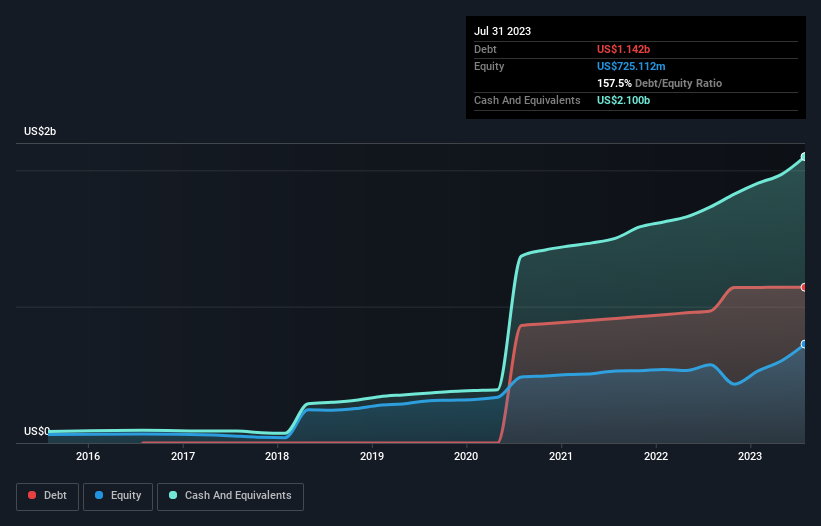Legendary fund manager Li Lu (who Charlie Munger backed) once said, 'The biggest investment risk is not the volatility of prices, but whether you will suffer a permanent loss of capital.' So it seems the smart money knows that debt - which is usually involved in bankruptcies - is a very important factor, when you assess how risky a company is. We note that Zscaler, Inc. (NASDAQ:ZS) does have debt on its balance sheet. But the real question is whether this debt is making the company risky.
What Risk Does Debt Bring?
Debt and other liabilities become risky for a business when it cannot easily fulfill those obligations, either with free cash flow or by raising capital at an attractive price. Ultimately, if the company can't fulfill its legal obligations to repay debt, shareholders could walk away with nothing. However, a more usual (but still expensive) situation is where a company must dilute shareholders at a cheap share price simply to get debt under control. Of course, plenty of companies use debt to fund growth, without any negative consequences. The first thing to do when considering how much debt a business uses is to look at its cash and debt together.
View our latest analysis for Zscaler
What Is Zscaler's Debt?
You can click the graphic below for the historical numbers, but it shows that as of July 2023 Zscaler had US$1.14b of debt, an increase on US$968.7m, over one year. But it also has US$2.10b in cash to offset that, meaning it has US$958.0m net cash.

How Strong Is Zscaler's Balance Sheet?
We can see from the most recent balance sheet that Zscaler had liabilities of US$1.54b falling due within a year, and liabilities of US$1.35b due beyond that. Offsetting this, it had US$2.10b in cash and US$589.8m in receivables that were due within 12 months. So its liabilities outweigh the sum of its cash and (near-term) receivables by US$193.1m.
Having regard to Zscaler's size, it seems that its liquid assets are well balanced with its total liabilities. So while it's hard to imagine that the US$24.1b company is struggling for cash, we still think it's worth monitoring its balance sheet. Despite its noteworthy liabilities, Zscaler boasts net cash, so it's fair to say it does not have a heavy debt load! The balance sheet is clearly the area to focus on when you are analysing debt. But ultimately the future profitability of the business will decide if Zscaler can strengthen its balance sheet over time. So if you want to see what the professionals think, you might find this free report on analyst profit forecasts to be interesting.
In the last year Zscaler wasn't profitable at an EBIT level, but managed to grow its revenue by 48%, to US$1.6b. With any luck the company will be able to grow its way to profitability.
So How Risky Is Zscaler?
While Zscaler lost money on an earnings before interest and tax (EBIT) level, it actually generated positive free cash flow US$334m. So although it is loss-making, it doesn't seem to have too much near-term balance sheet risk, keeping in mind the net cash. One positive is that Zscaler is growing revenue apace, which makes it easier to sell a growth story and raise capital if need be. But that doesn't change our opinion that the stock is risky. When analysing debt levels, the balance sheet is the obvious place to start. But ultimately, every company can contain risks that exist outside of the balance sheet. To that end, you should be aware of the 3 warning signs we've spotted with Zscaler .
If you're interested in investing in businesses that can grow profits without the burden of debt, then check out this free list of growing businesses that have net cash on the balance sheet.
Valuation is complex, but we're here to simplify it.
Discover if Zscaler might be undervalued or overvalued with our detailed analysis, featuring fair value estimates, potential risks, dividends, insider trades, and its financial condition.
Access Free AnalysisHave feedback on this article? Concerned about the content? Get in touch with us directly. Alternatively, email editorial-team (at) simplywallst.com.
This article by Simply Wall St is general in nature. We provide commentary based on historical data and analyst forecasts only using an unbiased methodology and our articles are not intended to be financial advice. It does not constitute a recommendation to buy or sell any stock, and does not take account of your objectives, or your financial situation. We aim to bring you long-term focused analysis driven by fundamental data. Note that our analysis may not factor in the latest price-sensitive company announcements or qualitative material. Simply Wall St has no position in any stocks mentioned.
About NasdaqGS:ZS
Flawless balance sheet with high growth potential.
Similar Companies
Market Insights
Community Narratives




